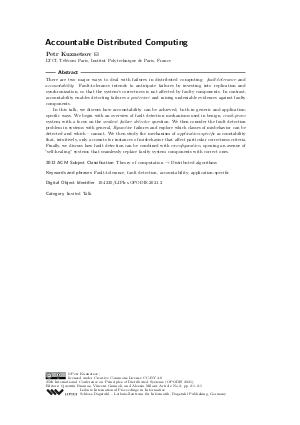Accountable Distributed Computing (Invited Talk)
Author Petr Kuznetsov
-
Part of:
Volume:
25th International Conference on Principles of Distributed Systems (OPODIS 2021)
Part of: Series: Leibniz International Proceedings in Informatics (LIPIcs)
Part of: Conference: International Conference on Principles of Distributed Systems (OPODIS) - License:
 Creative Commons Attribution 4.0 International license
Creative Commons Attribution 4.0 International license
- Publication Date: 2022-02-28
File

PDF
LIPIcs.OPODIS.2021.2.pdf
- Filesize: 271 kB
- 1 pages
Document Identifiers
Subject Classification
ACM Subject Classification
- Theory of computation → Distributed algorithms
Keywords
- Fault-tolerance
- fault detection
- accountability
- application-specific
Metrics
- Access Statistics
-
Total Accesses (updated on a weekly basis)
0Document
0Metadata
Abstract
There are two major ways to deal with failures in distributed computing: fault-tolerance and accountability. Fault-tolerance intends to anticipate failures by investing into replication and synchronization, so that the system’s correctness is not affected by faulty components. In contrast, accountability enables detecting failures a posteriori and raising undeniable evidences against faulty components. In this talk, we discuss how accountability can be achieved, both in generic and application-specific ways. We begin with an overview of fault detection mechanisms used in benign, crash-prone system, with a focus on the weakest failure detector question. We then consider the fault detection problem in systems with general, Byzantine failures and explore which classes of misbehavior can be detected and which - cannot. We then study the mechanism of application-specific accountability that, intuitively, only accounts for instances of misbehavior that affect particular correctness criteria. Finally, we discuss how fault detection can be combined with reconfiguration, opening an avenue of "self-healing" systems that seamlessly replace faulty system components with correct ones.
Cite As Get BibTex
Petr Kuznetsov. Accountable Distributed Computing (Invited Talk). In 25th International Conference on Principles of Distributed Systems (OPODIS 2021). Leibniz International Proceedings in Informatics (LIPIcs), Volume 217, p. 2:1, Schloss Dagstuhl – Leibniz-Zentrum für Informatik (2022)
https://doi.org/10.4230/LIPIcs.OPODIS.2021.2
BibTex
@InProceedings{kuznetsov:LIPIcs.OPODIS.2021.2,
author = {Kuznetsov, Petr},
title = {{Accountable Distributed Computing}},
booktitle = {25th International Conference on Principles of Distributed Systems (OPODIS 2021)},
pages = {2:1--2:1},
series = {Leibniz International Proceedings in Informatics (LIPIcs)},
ISBN = {978-3-95977-219-8},
ISSN = {1868-8969},
year = {2022},
volume = {217},
editor = {Bramas, Quentin and Gramoli, Vincent and Milani, Alessia},
publisher = {Schloss Dagstuhl -- Leibniz-Zentrum f{\"u}r Informatik},
address = {Dagstuhl, Germany},
URL = {https://drops.dagstuhl.de/entities/document/10.4230/LIPIcs.OPODIS.2021.2},
URN = {urn:nbn:de:0030-drops-157775},
doi = {10.4230/LIPIcs.OPODIS.2021.2},
annote = {Keywords: Fault-tolerance, fault detection, accountability, application-specific}
}
